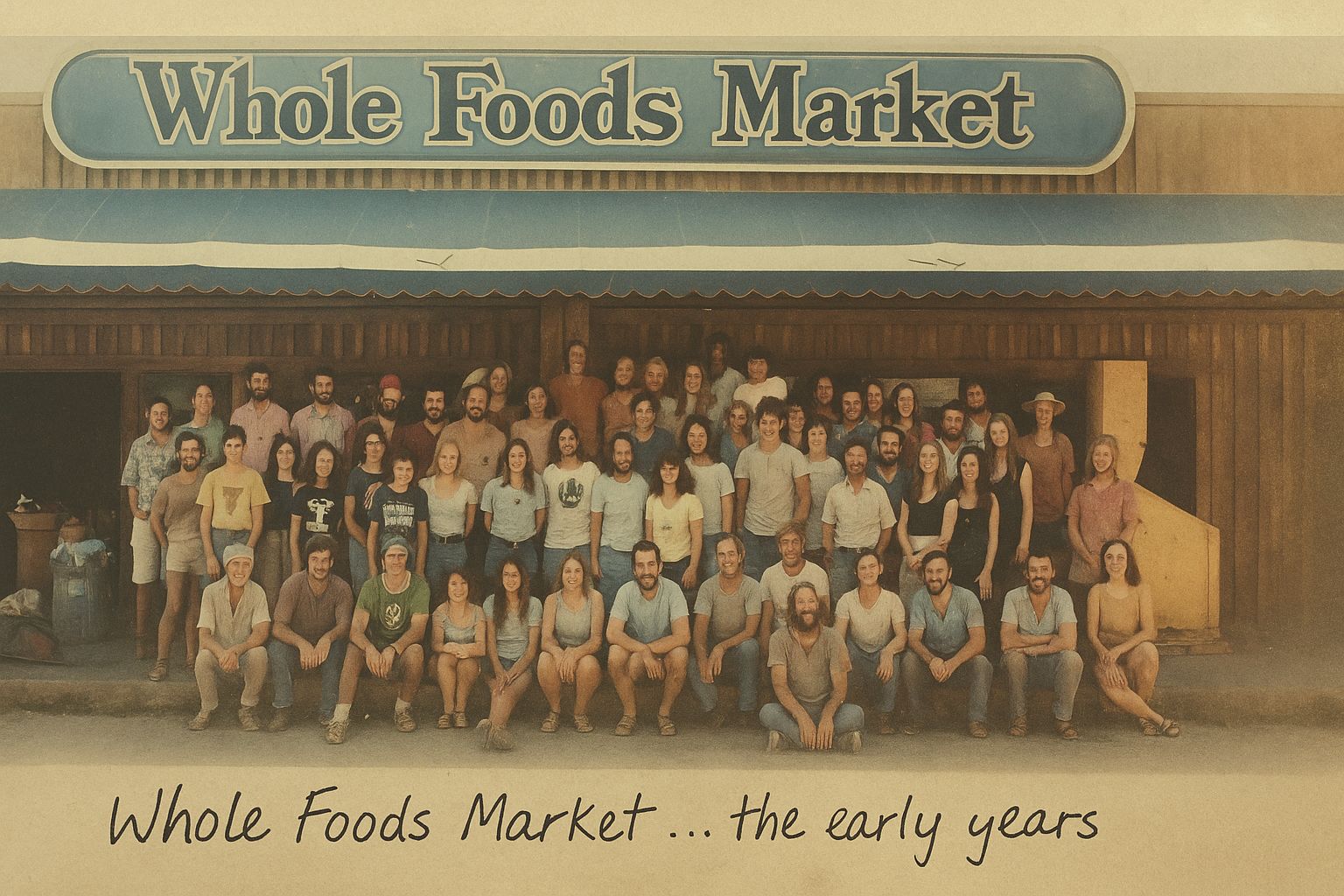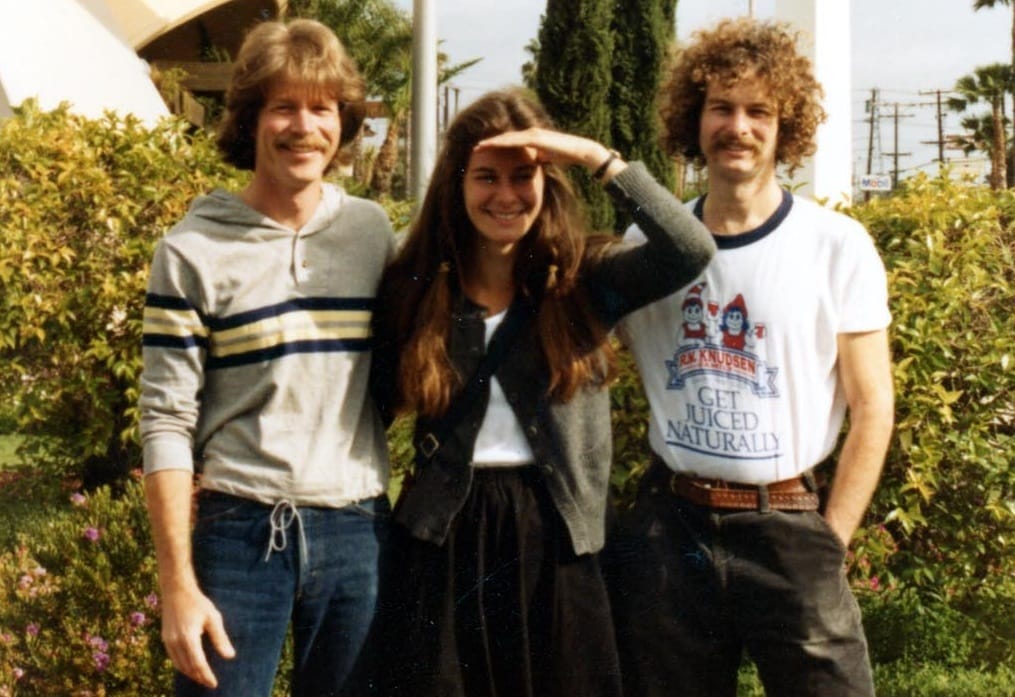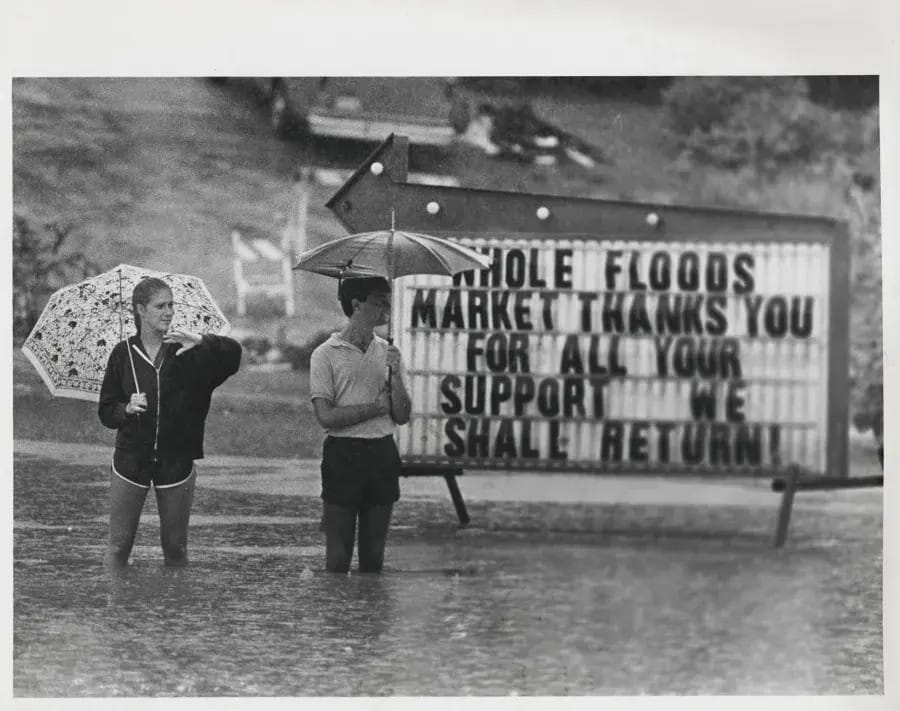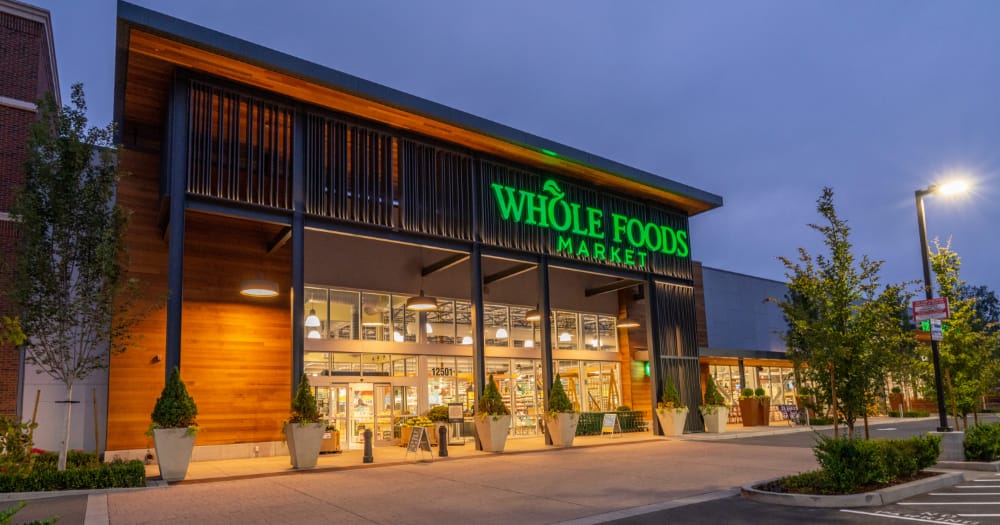John Mackey was a shy hippie who dropped out of college six times while searching for meaning.
He joined a vegetarian co-op to meet interesting people, and women.
That one decision, mixed with curiosity and a passion for healthy food, led him to start a natural foods market. Right when they got it going, a 100-year flood washed it away.
In today's issue, I share how that flood became the best thing that ever happened to his startup and helped him discover its purpose.
Along with:
3 storytelling lessons founders can steal from John’s journey
A fun fact on how Whole Foods helped fuel a $254 billion organic food industry
A video where John shares how “hippies selling to hippies” became a global movement
Enjoy this long strange trip it’s been for Mackey & crew… LG
Founder Story: John Mackey, Whole Foods

John Mackey spent his academic years studying philosophy, religion, and Eastern thought, attending multiple colleges before dropping out six times, accumulating over 130 hours of electives and no diploma.
During that period, he never took a single business class. He often said: "I think that worked to my advantage when I got into business. I didn't know what I wasn't supposed to do."
Instead, he immersed himself in ideas of personal growth, ecology, yoga, meditation, and communal living—movements that shaped his worldview.
THE COOP
At age 20, Mackey moved into the Prana House, a vegetarian co-op in Austin. One of the primary drivers? John was a bit shy and thought it would be a good way to meet interesting women.
He stated:
"I wasn't very successful picking women up, so I thought I'd move into closer proximity."
At Prana House, he met 19-year-old anthropology major Renee Lawson, who shared his curiosity about natural living and social change. Together they immersed themselves in discussions of organic farming, cooperative economics, and "right livelihood", the idea of making a living while doing good for others.
That move into the co-op proved transformative. It exposed Mackey to the emerging natural foods movement and gave him his first taste of entrepreneurship built around purpose.
THE SEED: SAFER WAY
Soon after, Mackey and Lawson decided to turn their ideals into a business. They borrowed $45,000 from friends and family, and opened a small natural food store in a creaky Victorian house in Austin. They called it Safer Way, a tongue-in-cheek play on the mainstream grocery chain Safeway.
The couple lived above their store, improvising basic necessities. The building wasn't zoned for housing, and they famously bathed using the hose of a Hobart industrial dishwasher. "We were dirty hippies," he joked, "but serious about food."
Safer Way sold strictly natural, vegetarian foods, no meat, no refined sugar, catering to Austin's small but passionate health-food community. The first year was rough: the store lost more than half its capital. Still, Mackey refused to quit. He convinced his investors to back a larger, better-organized store that could appeal to mainstream shoppers.
THE FLOWER: WHOLE FOODS
A year later, Safer Way was still struggling. Its strict vegetarian, no-sugar model alienated potential customers, and the business was quickly losing capital.
Across town, Clarksville Natural Grocery, founded by Mark Skiles and Craig Weller, had built a stronger following by offering a broader selection, meat, baked goods, coffee, while maintaining a focus on quality and natural ingredients.
Rather than compete and divide Austin's small health-food market, Mackey proposed a partnership: join forces to create something larger and more accessible than either could achieve alone.
The two stores merged, combining complementary strengths. Mackey and Lawson brought passion and product knowledge. Skiles and Weller contributed operational experience and supplier networks.
Together, they rebranded. The new name, Whole Foods Market, reflected a more inclusive vision, promoting whole, unprocessed foods without enforcing dietary restrictions.

Whole Foods founders Craig Weller, Renee Lawson Hardy, and John Mackey. Photo courtesy Whole Foods.
The four founders opened a 10,500-square-foot store staffed by 19 employees, one of the largest natural food markets in the nation at the time.
The expanded inventory included meat, seafood, beer, wine, coffee, and baked goods, an intentional move to welcome mainstream shoppers while maintaining natural standards.
As Mackey later described it, Whole Foods was "a supermarket for natural foods," a concept that had never been tried at scale.
Within six months, Whole Foods had become the highest-volume natural foods store in the United States, a signal that the organic movement was ready to go mainstream.
THE 100 YEAR FLOOD
Just eight months later, disaster struck. Austin's worst flood in decades left the new store under eight feet of water. Sewage forced out of pipes, inventory was destroyed, equipment ruined, and looters trashed what remained. The damage totaled roughly $400,000. And the business was uninsured.
Mackey recalled wading through dark water to retrieve whatever cash they had left in the store safe. "We thought we were pretty much out of business," he said. "By all rights, Whole Foods should have died through that flood."
Then something unexpected happened.
Employees refused to let the store die. Customers refused to let it go. They showed up with mops, buckets, and shovels, completely voluntarily, for no pay or expectation of reward.
Mackey was amazed. "Why are you doing this?" he asked one volunteer. The answer: "I'm not sure if I would want to live in Austin if the store wasn't here."
The entire Austin community rallied. Dozens of suppliers offered to resupply the store on credit because they cared about the business and trusted Mackey to repay them. Customers, suppliers, friends, family, and community all pitched in.

Within just 28 days, Whole Foods reopened. Customers and neighbors had joined staff to clean up and repair the damage. Creditors, vendors, and investors had all provided breathing room.
"This was the first moment I recognized the importance of the stakeholder model," Mackey said, "and experienced the power of love in business."
The flood became a foundational story in Whole Foods' culture, proof that when you build something with purpose, people will fight to keep it alive.
CREATING A NATURAL CATEGORY
Once Whole Foods recovered, Mackey turned to growth. The company opened its second store in Houston, then expanded to Dallas, New Orleans, and eventually the West Coast with a Palo Alto store, establishing Whole Foods as a national leader in the natural foods movement.

Mackey had merged idealism with operational discipline, pioneering a scalable model for organic supermarkets. Whole Foods became both a business and a mission: to bring healthier food to the mainstream.
Whole Foods went public, raising $28 million and valuing the company at $100 million. "One of the happiest days of my life," Mackey said. "It gave us the ability to grow while staying true to our purpose."
Over the next decade, Whole Foods acquired regional chains from coast to coast including Bread & Circus, Mrs. Gooch's, and Fresh Fields, reaching 100 stores before its largest deal: Wild Oats Markets for $565 million.
Eventually, Amazon acquired Whole Foods for $13.7 billion. Today, Whole Foods operates more than 570 stores across the U.S., Canada, and the U.K., employing over 105,000 people and generating roughly $27 billion in annual revenue
Storytelling Lessons: Be Imperfectly Honesty
John Mackey’s story resonates because it feels raw, funny, and deeply human. He’s the dropout who bathed in a dishwasher, lost half his savings, and still found a way to build one of the most recognizable brands in the world.
His story reminds founders that authenticity and heart beat polish and perfection every time. Here are three storytelling lessons founders can apply from Mackey’s journey.
Lead With Imperfect Honesty
Mackey never pretends to be someone he’s not. He laughs about joining a vegetarian co-op to meet women and freely admits he never took a business class. His openness about failure makes his success believable and his journey relatable.
Action to Take: Don’t polish away the rough edges of your story. Share the unfiltered truth of where your idea began and what you didn’t know. Your audience connects to honesty, not perfection.
Turn Setbacks Into Shared Triumphs
When the flood destroyed Whole Foods, Mackey could have told a story of personal loss. Instead, he told one of collective resilience. He reframed disaster as proof of community strength, not personal heroism. That shift from “I” to “we” turned adversity into inspiration.
Action To Take: Revisit your hardest challenge and tell it through the lens of the people who helped you rise. Let others share the spotlight in your story. When you highlight the team, customers, or community that stood beside you, your brand becomes bigger than one person, it becomes a movement.
Anchor Your Growth in Emotion, Not Milestones
Mackey’s story is an emotional evolution. From an unsure student to a purpose-driven founder, his narrative flows through discovery, doubt, failure, and persistence. Even as Whole Foods expanded to hundreds of stores and billions in revenue, he framed growth around purpose: bringing healthy food to the mainstream.
Action to Take: Don’t just list achievements; connect them to the emotional journey that fueled them. Every milestone in your story should answer why it mattered.
Fun Fact: Scaling Hippy Food
What began in 1980 as one Austin store run by two idealistic hippies grew into a movement that transformed how the world eats. Today, Whole Foods operates over 600 stores with 105,000 employees, and the organic food industry it helped spark is now worth $254 billion. With 62% of Americans preferring organic products and Whole Foods accounting for 4% of all U.S. grocery sales, one small idea to serve healthy food became a global shift in how we think about what’s on our plate.
Video to Watch: Finding Purpose in Food
In this candid conversation, John Mackey shares how a shy, long-haired philosophy student stumbled into his life’s purpose through a vegetarian co-op in Austin. From bathing in a dishwasher to building the world’s leading natural foods brand, Mackey’s passion and persistence come through in every moment.
This short film captures the spark, the setbacks, and the “aha” realization that a couple of hippies could change how the world eats.
📝 Work With Lyn to Tell Your Story
From DIY to done-for-you, here are ways I can help:
Free — Newsletter
Get weekly storytelling strategies.
👉 https://newsletter.storytellingforentrepreneurs.com/subscribeDIY — Course
Create your founder story from scratch with my step-by-step course.
👉 Newsletter readers get 20% off the $497 price.
https://storytelling4e.mysamcart.com/create-your-story-from-scratch/Done-With-You — Coaching
I’ve coached 300+ founders 1:1. We’ll build your story together, step by step.
(Rate: $350/hr • packages 6–20 hours)
👉 Email me: [email protected]Done-For-You — Video Production
1,200+ videos produced over 18 years. We’ll craft world-class story-driven content.
(Projects range from $10K–$100K)
👉 https://www.lgpictures.com/
Or email Lyn at: [email protected]
